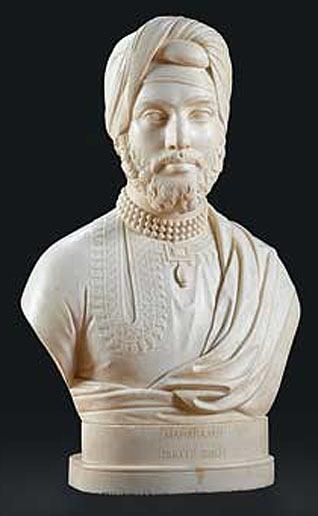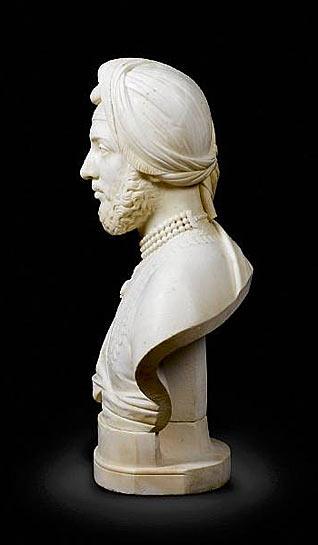Art
Marble Bust Stuns Art World
by ADAM GRETTON
A London auction house was stunned today as a Victorian bust of one of East Anglia's most important historical figures went under the hammer for £1.7m (US$ 3.4 million) - that is, 68 times its estimated value.
The rare and almost forgotten effigy of the Maharajah Duleep Singh, who lived at Elveden Hall, near Thetford, had been given a £25,000-£35,000 price tag by auctioneers Bonhams.
But its New Bond Street auction house was left buzzing after the white marble bust of Britain's first Sikh settler passed the million mark.
Julian Roup, of Bonhams, said there was "unprecedented" interest in the statue of the Sikh hero who was the last Maharajah of the Punjab and owner of the celebrated Koh-i-Noor diamond.
"It was one of those auctions where people were in disbelief and were holding their breaths. We had a lot of interest from the subcontinent and people were asking to be photographed standing alongside the historic figure, which shows the devotional aspect of this."
"We were surprised when it went past the half a million mark. When the hammer fell, cheers broke out. It is one of the best prices we have had this year," he said.
After a tug of war between nine bidders at the Bonhams Indian and Islamic sale, a UK private buyer spent £1.7m in a few minutes to keep the sought-after lot in Duleep Singh's adopted country.
The sculpture of the Maharajah wearing a turban, kaftan and pearl necklace, was made by renowned Royal Academician John Gibson, in Rome, between 1859 and 1860. It was valued at £5 in 1926 following the death of his second son Prince Frederick, who had kept the bust at his Blo Norton Hall home, near Diss.
It was sold again at Sotheby's in 1985 for £4,200, and had belonged to a London-based "lady of title" until yesterday.
Maharajah Duleep Singh was born in 1838 and was son of the legendary Lion of the Punjab, Maharajah Ranjit Singh, who carved out a kingdom, which is now split between India and Pakistan. At the age of 11, the young ruler of the Punjab was removed from his kingdom and the famous Koh-i-Noor diamond by the British East India Company after the Anglo Sikh Wars and exiled to Britain.
In adulthood, Duleep led the extravagant life of an Indian prince associating with the cream of Victorian society and became a favourite of Queen Victoria.
In 1863, he bought Elveden Hall and its 17,000 acre estate for £105,000 where he and his wife, Maharani Bamba, brought up their six children. He died alone in Paris in 1893 and was buried at Elveden church.
Hundreds of Sikhs still pay an annual pilgrimage to his tomb and his bronze statue at Butten Island, Thetford.
[Courtesy: EDP24]
Conversation about this article
1: Jay (London), April 21, 2007, 9:04 AM.
Two things make me curious - who was the buyer? And the final sentence of the report: "Hundreds of Sikhs still pay an annual pilgrimage to his tomb and his bronze statue at Butten Island, Thetford." Why? What is the point on going on a pilgrimage for him? Surely such displays are against Sikh principles, to worship a normal man who has no significance in the Sikh religion? [EDITOR'S REPLY: The word "pilgrimage" was used as a metaphor in the article, and has no religious connotation whatsoever. Sikhs do not do religious pilgrimages. But they do historical pilgrimages, such as the one currently being promoted by the Anglo Sikh Heritage Trail in the United Kingdom. Duleep Singh, the last Emperor of Punjab, has immense significance in the context of Sikh, British and world history and deserves all the attention he is finally getting, and much more. His life and times warrant in-depth, objective and independent research, free from vested interests ... the least bit of serious digging is guaranteed to reveal a motherlode of gems and nuggets ... Editor, sikhchic.com]




